News & Stories
2023
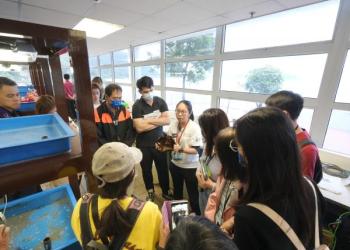
Stories
HKUSTours: Exploring Sustainability and Conservation at HKUST
The Hong Kong University of Science and Technology (HKUST) launched HKUSTours in 2023, an innovative community engagement initiative in partnership with Kaifong Tour, a social enterprise founded by HKUST alumni. This ongoing program promotes sustainable tourism practices while fostering deeper appreciation for ecosystem conservation within our local community.Educational FocusHKUSTours offers visitors an immersive experience centered on the region's natural heritage and biodiversity. Through carefully curated tours of HKUST's picturesque Clear Water Bay campus, participants gain valuable insights into the area's rich natural resources and discover the university's sustainable development initiatives. The program emphasizes the critical importance of environmental and biodiversity conservation through engaging storytelling and hands-on experiences.
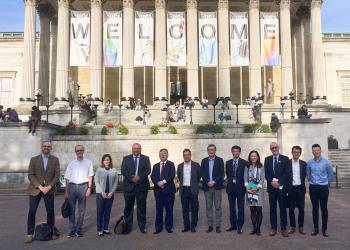
News
HKUST Leadership Engages in Global Exchange Tour in Europe to Strengthen Global Partnerships
The Hong Kong University of Science and Technology (HKUST) senior management team embarked on an European tour in early October. This strategic expedition, which spanned four countries over the course of five days, aimed at strengthening international collaborations and highlighting HKUST's cutting-edge developments in AI, Innovation, and SmartCities.
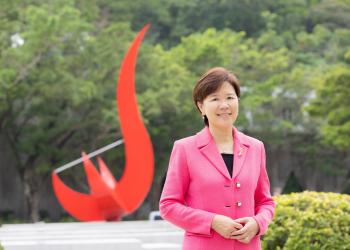
News
HKUST President Prof. Nancy IP Welcomes Policy Address
Prof. Nancy IP, President of the Hong Kong University of Science and Technology (HKUST), warmly welcomes and expresses deep appreciation for the comprehensive range of initiatives introduced by Chief Executive Mr. John LEE in his Policy Address today, especially those aim to position Hong Kong as a prominent global hub for post-secondary education and further promote the city as an international center for innovation and technology.
The initiatives, which include doubling the admission quota of non-local students at government-funded universities to 40%, scaling up investment in research and development, establishing the third InnoHK cluster, building the “Northern Metropolis University Town”, developing Hong Kong into a health and medical innovation hub, as well as different measures to attract and retain talent, will effectively enhance Hong Kong's position as a global innovation powerhouse with strong intellectual property value.
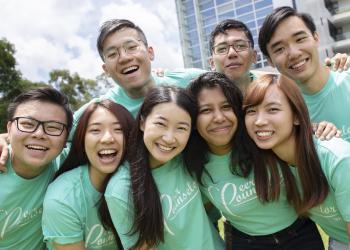
News
Joint Statement: Prioritising Mental Health and Building Connections Among University Students in Hong Kong
We are saddened by the recent spate of tragic incidents involving the passing of our students and young people. As the representatives responsible for student affairs at eight local universities, we are determined to give the highest priority to the mental well-being of our students. We care deeply for their wellness and recognize the unique challenges they face, and will spare no effort in creating a supportive environment that encourages compassion, connection, and mutual care.
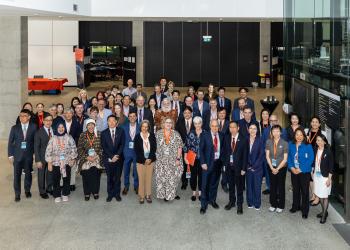
News
HKUST Enhances Global Educational Ties with Australian Institutions
HKUST Enhances Global Educational Ties with Australian Institutions
The Vice President for Institutional Advancement of the Hong Kong University of Science and Technology (HKUST) Prof. WANG Yang, along with Dean of Engineering, Prof. Hong LO and Head of Global Engagement and Greater China Affairs Ms. Yvonne LI embarked on a visit to Sydney and Brisbane to engage with partners and stakeholders in Australia.
Prof. Wang participated in the Association of Pacific Rim Universities (APRU) Senior International Leaders' Meeting themed ‘One Pacific’ on September 25. The meeting provided a platform for representatives from 40 universities across Asia-Pacific to discuss about pressing challenges facing by the Asia-Pacific countries and explore the potential solutions.
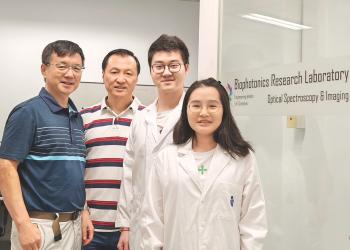
News
HKUST researchers Develop an Innovative Microscope Platform to Unveil the Intricacies of Skeletal Muscle Regeneration
Researchers at the Hong Kong University of Science and Technology (HKUST) have created a cutting-edge platform consisting of a dual-laser nonlinear optical microscope to investigate the dynamics of muscle satellite cells (MuSCs) during the process of muscle regeneration. This breakthrough has identified new mechanisms of MuSC behavior in muscle repair, paving the way for the development of targeted therapeutic strategies for muscle-related disorders.
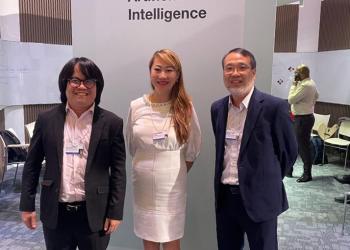
News
HKUST Faculty Members attend the World Economic Forum’s Annual Meeting of the Global Future Councils 2023 in Dubai
Three faculty members from the Hong Kong University of Science and Technology (HKUST) participated in the World Economic Forum’s Annual Meeting of the Global Future Councils (GFC) held from October 16 to 18, 2023, in Dubai, United Arab Emirates.
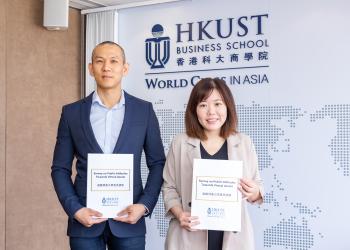
News
HKUST Releases Survey Findings on Public Attitudes Towards Virtual Assets
The School of Business and Management of The Hong Kong University of Science and Technology (HKUST Business School) found that 41 percent of Hong Kong people prefer not to hold virtual assets (VAs) Note 1, up by 12 percentage points from a previous survey, in the aftermath of an alleged financial fraud that involved a cryptocurrency platform in mid September.
This is one of the major findings of a two-phase survey released today by HKUST Business School. According to the survey findings, about 20 percent respondents say they would like to hold VAs in the future, down by five percentage points compared with one conducted months before the financial incident.








